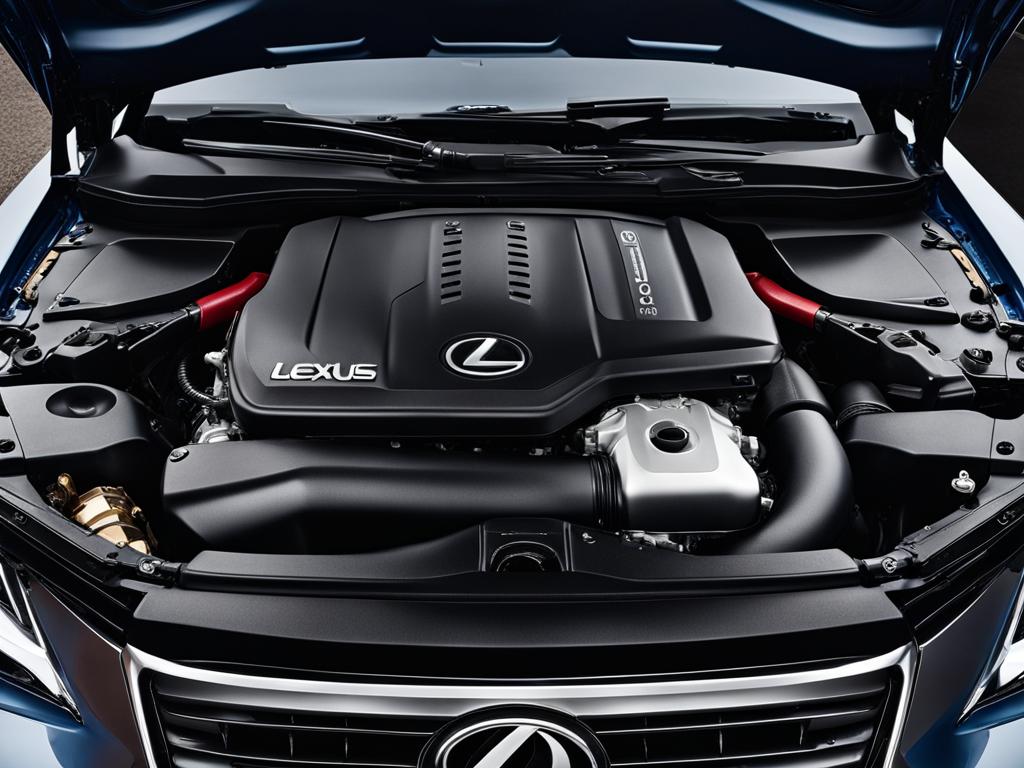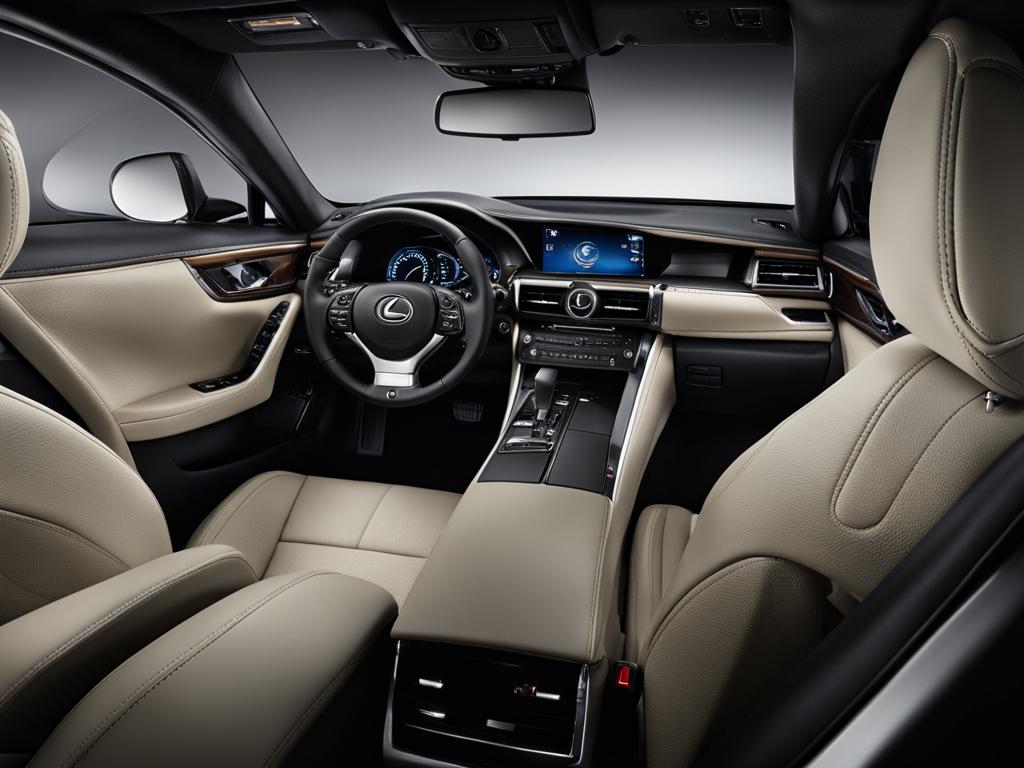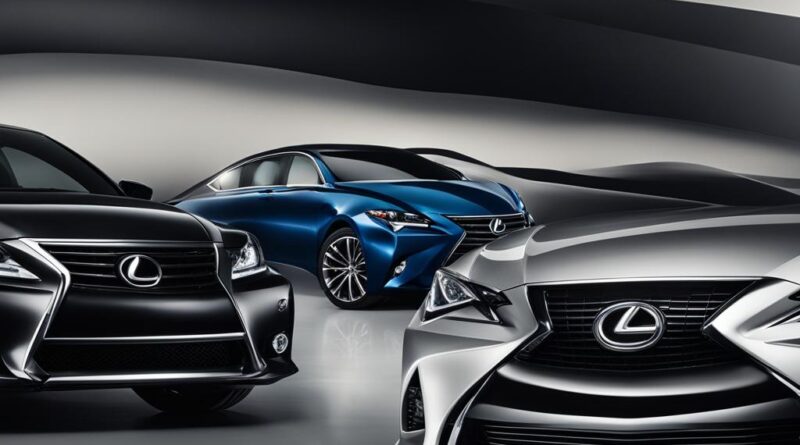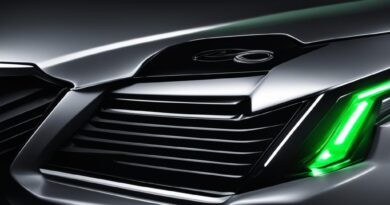Lexus IS vs GS: Luxury Sedan Showdown
In the world of luxury sedans, the debate between the Lexus IS and GS models has captured the attention of car enthusiasts and potential buyers alike. With discussions centered around performance, design, and luxury features, comparing these two formidable contenders goes beyond simple specifications. In this article, we dive deep into the Lexus IS vs GS differences to offer a comprehensive comparison that helps you make an informed decision.
But first, let’s take a look at the key takeaways highlighting the prominent distinctions between the Lexus IS and GS models.
Key Takeaways
- The Lexus IS is known for its sportier design and performance-focused driving experience, while the GS caters to a more luxurious and comfort-centered audience.
- Performance-wise, the IS350 boasts quicker acceleration and consistently impressive quarter-mile times, while the GS450h may have an edge in mid-range speeds.
- Interior space and luxury features are more abundant in the GS models than their IS counterparts, justifying a higher price point.
- The Lexus IS offers a balance of performance and high-end features at a more budget-friendly price, making it an appealing option for younger buyers.
- Both the Lexus IS and GS demonstrate reliability and dependability, with the GS450h showcasing Lexus’s commitment to eco-friendly advancements.
Introduction to the Lexus Luxury Sedan Rivals
When diving into the Lexus IS vs GS 2021 discussion, it’s evident that the two luxury sedans cater to different segments of the market, showcasing a variety of features and performance capabilities. The Lexus IS, more commonly seen and often appealing to a younger audience, has been praised for delivering impressive acceleration, boasting 0-60 mph times in the low 5-second range. Contrasting this, the GS450h offers a blend of elegance, comfort, and hybrid technology, ensuring a luxurious and efficient driving experience, albeit at a higher price point.
Notably, distinctions between the two models extend to driver experiences, such as the ability to disable traction control during vehicle launch. This functionality varies between the IS and GS, affecting performance outcomes and reinforcing the unique identity of each sedan. As a result, potential buyers considering these models will find that Lexus IS vs GS reliability and performance are crucial aspects to mull over before making their choice.
- The Lexus IS: A sporty sedan with impressive acceleration capabilities and a younger appeal.
- The Lexus GS450h: An elegant and comfortable hybrid sedan, boasting luxury features for a more mature audience.
“The choice between the Lexus IS and GS largely depends on the buyer’s preferences and priorities. Whether it’s the IS’s sporty performance or the GS’s elegant comfort, each model offers a unique driving experience that caters to different audiences.”
In conclusion, the Lexus IS and GS represent two distinct approaches to the luxury sedan market, each with its own set of advantages and target demographics. Comparing these models based on their performance, reliability, and innovative features will ultimately guide potential buyers towards the option better suited to their needs and preferences.
The Battle of Performance: Lexus IS vs GS Dynamics
A core aspect of the Lexus IS vs GS debate revolves around performance dynamics, as enthusiasts analyze Lexus’s ability to deliver impressive acceleration and overall driving experiences in the two luxury sedan models. This section will delve into the Lexus IS’s performance credentials, the GS’s power and drive, and real-world acceleration data to provide a thorough comparative analysis.

Lexus IS Performance Credentials
Renowned for its impressive performance credentials, the Lexus IS boasts quick acceleration and consistent quarter-mile times that appeal to track enthusiasts. A prime example is the Lexus IS350, which is capable of achieving quarter-mile runs under 13.5 seconds. This suggests a potential edge in raw acceleration over the GS. Contributing factors to the IS350’s dynamic performance are its relative lightness and gearing that supports quickness up to 100 mph.
Lexus GS Power and Drive
While the Lexus GS, particularly the GS450h, tends to be less common on the race track, it has been subject to numerous debates about its potential to outpace the IS350 under specific conditions. The GS450h’s weight hampers its off-the-mark acceleration, but it exhibits competitive mid-range speeds. Additionally, the GS450h claims victories over its IS counterpart in terms of interior space, comfort, and luxury features, reflecting the manufacturer’s intent to offer a diverse range of experiences across their sedan lineup.
Real-World Acceleration and Track Times
Real-world results and driver experiences play a vital role in the comparison between the Lexus IS and GS models. Data obtained from drag times illustrates the IS350’s prowess in terms of acceleration, with the IS consistently outperforming stock GS450h’s in quarter-mile tests. These discussions highlight that although the IS may hold a slight advantage in acceleration at a standstill, the GS becomes a more formidable rival once momentum picks up. It is the synergy between virtual and real-world test results that ultimately shapes the perceived performance narrative of these Lexus models.
Lexus IS vs GS: Design and Luxury Features
The design and luxury features of the Lexus IS and GS cater to different preferences and priorities among luxury sedan buyers. While the IS presents a sportier aesthetic and a dynamic driving experience, confirmed by firsthand reports of engaging 0-60 mph times, the GS450h takes a different route, valuing interior spaciousness, comfort, and a host of upscale features. This distinction is further emphasized by the fact that the GS450h is significantly more expensive compared to the IS, expected to excel in areas other than just speed, such as in-cabin luxury and overall traveling comfort.
Choosing between the Lexus IS and GS models becomes easier when focusing on the interior design and price. Below is a comparison table highlighting the main features:
| Feature | Lexus IS | Lexus GS |
|---|---|---|
| Interior Design | Sportier and driver-centric | Elegant and spacious |
| Price | More budget-friendly | Higher price tag |
| Target Demographic | Younger drivers seeking performance | Mature buyers valuing luxury and comfort |
| Luxury Features | Competitive and high-quality | More extensive and upscale |
Comparing these features, it is clear that each model has been designed for a specific target audience. The Lexus IS caters to those who appreciate performance and sporty design within a more budget-conscious price range. The Lexus GS, on the other hand, appeals to buyers who are willing to pay a premium for the enhanced interior space, comfort, and luxury features.
Ultimately, the choice between the Lexus IS and GS depends on the individual’s preferences in terms of design, luxury features, and price. Both models offer unique experiences, ensuring the satisfaction of a wide range of luxury sedan buyers.
Understanding the Price Gap: Lexus IS vs GS
As prospective buyers compare the Lexus IS and GS, one of the most notable differentiating factors is the price. Price-conscious shoppers might favor the IS model, which offers high performance and luxury at a more affordable price point. Conversely, those with more flexible budgets might appreciate the range of luxury amenities offered by the GS model, particularly the GS450h. In this section, we’ll explore the reasons behind the price gap between Lexus IS and GS models, as well as the value proposition each model delivers for potential owners.

Value for Money in the IS Model
The Lexus IS model has gained popularity among enthusiasts for its ability to deliver impressive performance and luxury features at a lower price than many competitors. Among the Lexus IS lineup, the IS350 stands out for its remarkable 0-60 mph acceleration, which rivals that of more expensive sedans. The IS350’s performance specifications, coupled with its relatively budget-friendly price, position it as an attractive option within Lexus’s sedan offerings.
GS Luxury Comes at a Cost
The GS model, and specifically the GS450h, is positioned at a higher price point compared to the IS. This reflects its premium status, as it boasts an array of luxury amenities and features, as well as a sophisticated hybrid powertrain. The GS450h offers an expansive interior space and a comfort-centric design, considered superior to that of the more affordable IS model. The GS450h demonstrates Lexus’s commitment to blending opulence with eco-friendly performance, justifying its higher price in comparison to the Lexus IS.
| Model | Base Price | Key Features |
|---|---|---|
| Lexus IS | $39,000 |
|
| Lexus GS | $51,065 |
|
In summary, both the Lexus IS and GS models offer distinct advantages in terms of performance, luxury, and pricing. Shoppers who prioritize value for money might be drawn to the Lexus IS, while those seeking an elevated level of luxury might find the GS model a more suitable choice. Ultimately, the decision between the two models will depend on individual preferences and priorities.
Lexus IS vs GS Reliability and Ownership Costs
For potential buyers, the reliability and ownership costs of both the Lexus IS and GS models play a crucial role in making an informed decision. Dragstrip data, as well as forum discussions, vouch for the IS model’s performance. These conversations often extend to an examination of how these vehicles hold up over time.
Reliable acceleration figures and consistent real-world performances suggest that IS models are built to withstand the tests of both time and speed. This is particularly true of the Lexus IS, which caters to a younger demographic. Conversely, the GS model, including the 450h variant, is praised for its interior comforts and luxury features that contribute significantly to the consideration of long-term dependability.

When it comes to maintenance and ownership costs, the Lexus IS is commended for providing a budget-friendly option in Lexus’s luxury sedan lineup. Nevertheless, as with any high-performance vehicle, proper care and regular maintenance ensure the longevity and reliability of both IS and GS models.
It is essential to consider the cost of hybrid technology when evaluating the ownership costs of the GS450h, given its focus on environmental performance and efficiency.
With the aim of providing a succinct overview of Lexus IS vs GS reliability and ownership costs, the following table presents key differentiators and factors to consider:
| Factor | Lexus IS | Lexus GS |
|---|---|---|
| Target Demographic | Younger Buyers | Mature Buyers |
| Reliability | Robust performance over time | Focus on interior comforts and long-term dependability |
| Maintenance Costs | Cost-conscious luxury option | Higher investment for hybrid technology and luxury features |
In conclusion, both Lexus IS and GS models offer distinct advantages in terms of reliability and ownership costs. Prospective buyers must weigh the factors surrounding performance, demographics, and long-term maintenance to make the best decision for their unique needs and preferences.
Comparing Interiors: Comfort and Space
When it comes to the Lexus IS vs GS interior, both models provide their distinct take on cabin design and luxury amenities. In this section, we’ll take a closer look at the differences in their approach to ergonomics, comfort, and the array of luxury features each model has to offer.

Cabin Design and Ergonomics
The Lexus IS focuses on a driver-centric environment, aligning with its sporty characteristics. This approach is appreciated by owners who prioritize dynamic driving and a more engaging experience behind the wheel. In contrast, the GS, particularly the GS450h, encompasses generous interior dimensions, which provide enhanced comfort and an ergonomically pleasing setup that supports a luxury travel experience.
Luxury Amenities in IS and GS
When examining the Lexus IS vs GS luxury features, it’s evident that the GS outshines its counterpart. While supporters of the IS model often acknowledge its high-end features amid its affordability, the GS is regarded as the pinnacle of Lexus luxury with an extensive set of premium options. This distinction plays a significant role in assessing the perceived value of each model line, as these amenities contribute to the overall driving and ownership experience. To further understand the contrasts in their offerings, let’s take a look at a comparison of key specifications and features:
| Features | Lexus IS | Lexus GS |
|---|---|---|
| Leather upholstery | Standard | Standard |
| Heated and ventilated front seats | Available | Standard |
| Upgraded audio system | Available | Standard |
| Power rear sunshade | Not available | Available |
| Tri-zone automatic climate control | Not available | Available |
In conclusion, when comparing the Lexus IS vs GS differences in terms of interior comfort, space, and luxury features, it is clear that both models cater to distinct preferences. While the Lexus IS offers a sportier cabin design with a focus on driver engagement, the Lexus GS excels in delivering comfort and an impressive array of lavish amenities. Ultimately, it comes down to the individual needs and desires of prospective car buyers when weighing their options and making a decision.
Conclusion
In this Lexus IS vs GS 2021 comparison, we have examined two distinct luxury sports sedan models, each catering to different preferences and expectations within the automobile market. The Lexus IS is known for its quick acceleration and excellent value for money, while the Lexus GS offers a commitment to interior luxury, sophistication, and overall comfort. Both models provide unique benefits, appealing to varied segments of luxury car enthusiasts.
The reliability of these Lexus models is critical for potential buyers, and this comparison has highlighted how each car performs in real-world situations, emphasizing the Lexus IS’s consistent acceleration and the GS’s premium features. The choice between these two sedans ultimately depends on individual priorities and preferences: for some, speed and agility may be the deciding factors, while for others, opulence and advanced features will play a more significant role.
To summarize, both the Lexus IS and GS models showcase the high standard of quality that has come to define the Lexus brand, delivering a luxury sports sedan experience uniquely tailored to different tastes and lifestyles. As customers weigh their options and consider the Lexus IS vs GS comparison, the decision will ultimately hinge on the aspects of performance, reliability, and luxury that resonate most with their personal values and driving preferences.
FAQ
What are the main differences between the Lexus IS and GS models?
The main differences between the Lexus IS and GS models lie in performance, design, target demographics, and price. The IS offers a sportier look and quicker acceleration, making it appealing to a younger audience, while the GS, and specifically the GS450h, is designed with more focus on luxury, comfort, and efficiency, appealing to buyers seeking a high-end experience.
How does the performance of the Lexus IS compare to the GS?
The Lexus IS generally has a quicker acceleration and lighter build, providing a more dynamic driving experience. However, the GS450h offers competitive mid-range speeds due to its hybrid powertrain and can be more engaging once it gains momentum.
Why is there a price difference between the Lexus IS and GS?
The difference in price between the Lexus IS and GS is mainly due to the unique features and intentions behind each model. The IS offers generally high performance and quality at a more affordable price point, while the GS, and particularly the GS450h, is more expensive due to its luxury features, hybrid technology, and focus on comfort.
How reliable are the Lexus IS and GS?
Both the Lexus IS and GS are known for their reliability and quality. Discussions and data on IS models’ performance suggest that they are built to withstand time and speed. The GS, including the 450h variant, is praised for its interior comfort and luxury features, reflecting the commitment to long-term dependability and the cost of hybrid technology maintenance.
Which Lexus sedan has the better interior – the IS or the GS?
Comparing the interiors largely depends on personal preferences. The Lexus IS offers a sportier and more driver-centric interior experience, while the GS, and specifically the GS450h, boasts a more spacious, comfortable, and ergonomically pleasing interior that caters to luxury travel preferences.




